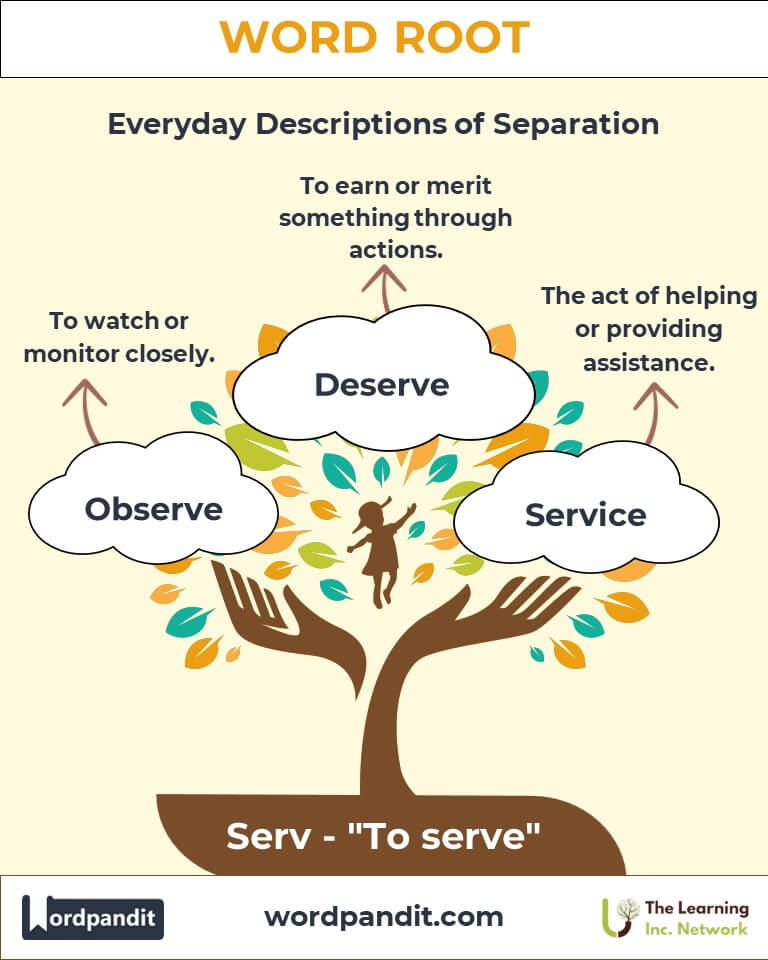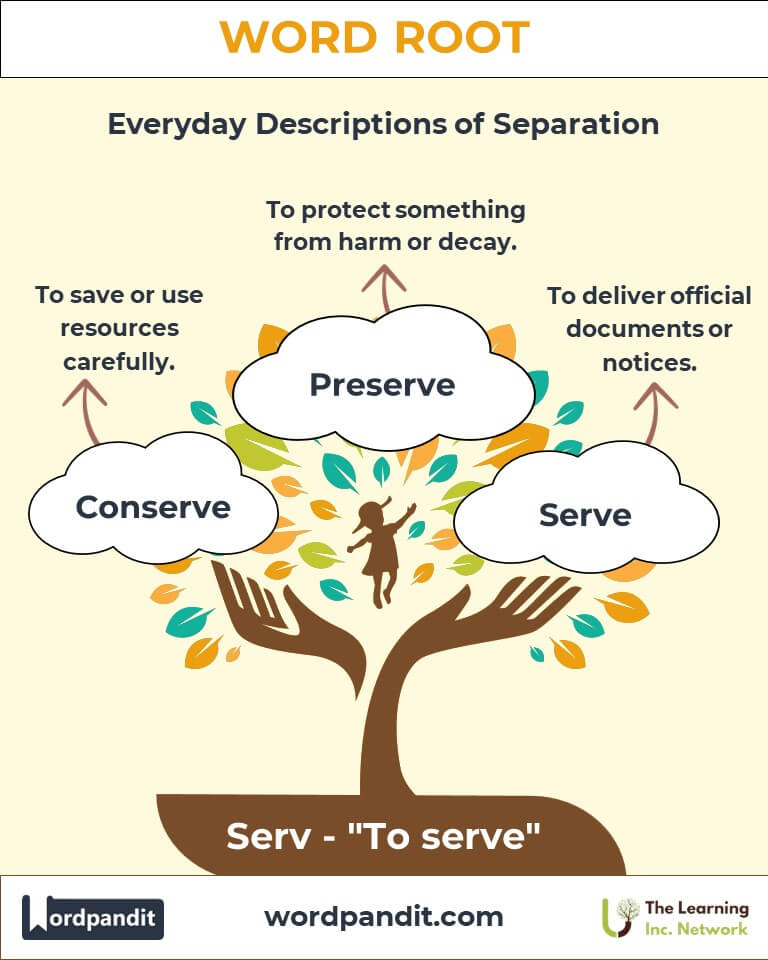Serv: The Foundation of Service and Preservation
Byline: Discover the rich versatility of the Latin root "serv," meaning "to serve." From everyday terms like "service" to specialized words like "preserve," "serv" reflects humanity's dedication to helping, protecting, and maintaining. Dive into its history, applications, and enduring relevance.

Table of Contents
- Introduction: The Core of "Serv"
- Etymology and Historical Journey
- Mnemonic: Unlocking the Power of "Serv"
- Common "Serv"-Related Terms
- "Serv" Through Time
- "Serv" in Specialized Fields
- Illustrative Story: "Serv" in Action
- Cultural Significance of the "Serv" Root
- The "Serv" Family Tree
- FAQs About the "Serv" Word Root
- Test Your Knowledge: "Serv" Word Root Quiz
- Conclusion: The Living Legacy of "Serv"
1. Introduction: The Core of "Serv"
What does it mean to serve? To offer assistance, to safeguard, to fulfill a duty—all of these ideas stem from the Latin root "serv," pronounced ser-v. Whether used in "service" or "preserve," this root reflects actions tied to duty, support, and care. Its applications stretch across language, culture, and disciplines, from hospitality to environmental conservation.

2. Etymology and Historical Journey
The root "serv" originates from the Latin servire (to serve) and servus (slave or servant). Historically, it evolved through Old French (servir) before entering English. While it once signified servitude in its strictest sense, its modern usage has broadened to encompass voluntary acts of assistance and protection, shedding its historical connotations of compulsion.
3. Mnemonic: Unlocking the Power of "Serv"
Imagine a superhero with the emblem "SERV" on their chest, rushing to help others or safeguard treasures. This image underscores the root's dual meaning: to serve others and to preserve something valuable.
Mnemonic Device: "SERV heroes serve and preserve with purpose."
4. Common "Serv"-Related Terms
- Service (ser-vis): The act of helping or providing assistance.
Example: "The waiter’s excellent service earned him a generous tip." - Preserve (pre-zerv): To protect something from harm or decay.
Example: "National parks are preserved to maintain their natural beauty." - Conserve (kon-surv): To save or use resources carefully.
Example: "It’s vital to conserve water during a drought." - Observe (ob-zerv): To watch or monitor closely.
Example: "Astronomers observe celestial events through powerful telescopes." - Deserve (de-zerv): To earn or merit something through actions.
Example: "She worked hard and deserved the recognition she received."
5. "Serv" Through Time
- Servus (Latin): Initially referred to a slave or servant, highlighting societal hierarchies in ancient Rome.
- Service (Middle Ages): Gained prominence in feudal systems, referring to duties owed by vassals to their lords.
- Preserve (Modern Era): Now symbolizes efforts to protect nature, history, and culture for future generations.
6. "Serv" in Specialized Fields
- Hospitality: Service refers to the quality of assistance provided to customers.
Example: "Luxury hotels prioritize exceptional service to delight guests." - Environment: Conserve highlights efforts to protect natural resources.
Example: "Conservationists conserve endangered species through protected habitats." - Science: Observe is fundamental in research and experimentation.
Example: "Scientists observe changes in ecosystems to understand climate impacts." - Legal: Serve describes delivering official documents or notices.
Example: "The lawyer served the subpoena to the defendant."
7. Illustrative Story: "Serv" in Action
Maya, a park ranger, dedicated her life to preserving wildlife. One summer, she observed that the local bear population was dwindling due to habitat loss. Collaborating with her team, she developed a conservation plan. By protecting the bears’ habitat and serving as an educator for visitors, Maya exemplified the dual spirit of "serv"—to serve and preserve.
8. Cultural Significance of the "Serv" Root
Across cultures, serving others is a cornerstone of morality and community. Religious and philosophical texts emphasize service as a virtue, from helping the needy to preserving sacred traditions. In modern times, the concept of service has expanded to include customer service, public service, and environmental stewardship.

9. The "Serv" Family Tree
- Servus (Latin: Slave/Servant)
- Conservare (Latin: To keep/maintain): Root of "conserve."
- Observare (Latin: To watch/attend): Root of "observe."
- Deservire (Latin: To serve well): Root of "deserve."

10. FAQs About " Serv "
Q: What does the root "serv" mean?
A: The root "serv" comes from the Latin servire and servus, meaning "to serve" or "slave." Over time, its meaning evolved from compulsory servitude to voluntary service, reflecting dedication, assistance, and preservation in various contexts.
Q: What is the difference between "preserve" and "conserve"?
A: "Preserve" means to protect something in its original state, ensuring it remains untouched or unaltered. For example, "National parks are preserved to maintain their natural beauty." "Conserve" emphasizes careful use while preventing waste or depletion. For instance, "It is crucial to conserve water during droughts."
Q: Does "observe" always mean to watch?
A: While "observe" often means to watch closely, such as observing stars in the sky, it can also mean to follow rules, customs, or traditions. For example, "We observe Earth Day by planting trees."
Q: How does "deserve" relate to "serv"?
A: "Deserve" comes from the Latin deservire, meaning "to serve well." The term evolved to imply earning something based on one’s actions. For instance, "She deserves recognition for her hard work."
Q: Why is "service" important in various industries?
A: "Service" plays a vital role in industries such as hospitality, healthcare, and business by meeting the needs of clients or customers. It often defines the quality of a company's reputation and customer satisfaction.
11. Test Your Knowledge: " Serv " Mastery Quiz
1. What does the root "serv" mean?
2. Which term means "to protect something from harm"?
3. What does "observe" imply in scientific contexts?
4. Which word describes the careful use of resources?
5. What does "deserve" mean?
12. Conclusion: The Living Legacy of "Serv"
The root "serv" embodies essential human values: support, protection, and duty. Whether we serve others or preserve what we value, this root reminds us of our interconnected roles in sustaining life and community. Let the "serv" root inspire you to make a positive impact through service and conservation.














